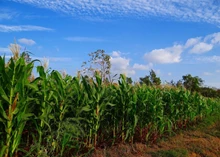
Scientists have created a transgenic cow that can produce human insulin in its milk—a stunning discovery that has the potential to completely change the way medicine is administered. Led by Professor Matt Wheeler of the Department of Animal Sciences at the University of Illinois, this pioneering research holds vast potential in addressing the global demand for insulin, especially with the escalating prevalence of diabetes worldwide.
The World Health Organization estimates that 422 million people worldwide suffer from diabetes, a disease marked by elevated blood sugar levels. Type 1 diabetes results from the body's inability to produce insulin, while type 2 diabetes arises when the body fails to produce enough insulin or becomes resistant to its effects.
Published in the Biotechnology Journal, the research represents a significant leap forward in genetic engineering. By harnessing the natural capabilities of the mammary gland, the team successfully integrated human DNA into the cow's genetic makeup, effectively transforming it into a transgenic organism capable of producing human insulin.
The method employed in this groundbreaking study involves utilizing transgenic animals as bioreactors for the production of pharmaceutical proteins, presenting a cost-effective and efficient alternative for large-scale protein production. The mammary gland, known for its capacity for posttranslational modifications, serves as an ideal tissue for recombinant protein production.
The initial phase of the process entails introducing a transgene into the animal, driving the expression of the desired protein in a tissue-specific manner within the mammary gland. Through a combination of lentivirus-mediated gene transfer and somatic cell nuclear transfer (SCNT) methodologies, the researchers successfully engineered a transgenic calf capable of producing human proinsulin in its milk.
Evaluation of the vector construction using mammary epithelial cells (MAC-T cells) demonstrated the expression of the human proinsulin gene upon induction with lactogenic hormones. Subsequent analysis confirmed the presence of recombinant protein in the milk of transgenic cows, as detected through mass spectrometry.
While the prospect of harnessing transgenic cows for the production of human insulin holds immense promise, challenges such as proteolysis of recombinant protein by milk proteases necessitate further investigation. Nevertheless, this innovative approach signifies a significant step forward in meeting the growing demand for insulin and offers hope for improved diabetes management worldwide.
The successful development of a transgenic cow capable of producing human insulin in its milk represents a critical advancement in biotechnology, paving the way for novel therapeutic interventions and addressing critical healthcare needs on a global scale.










